
Barry Manilow II is the second studio album by Barry Manilow released in 1974. Propelled by the major success of its lead single "Mandy" and featuring a further international hit in "It's a Miracle", the album was a commercial breakthrough for Manilow. First issued by Bell Records, it was reissued after the company was reorganized into Arista Records. The album's success spawned a notable parody in the picture sleeve of Ray Stevens' 1979 single, "I Need Your Help Barry Manilow".
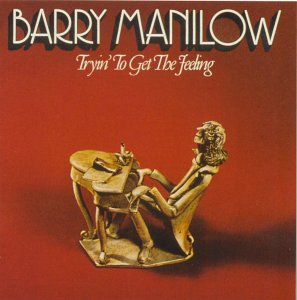
Tryin' to Get the Feeling is the third studio album by singer-songwriter Barry Manilow, released in 1975. It features the title track, "Tryin' to Get the Feeling Again", together with other hits including "New York City Rhythm", "Bandstand Boogie" and the chart-topping "I Write the Songs". The album debuted on the Billboard Top 200 Chart on November 8, 1975, reaching number five in early 1976, and eventually was certified double platinum. It peaked at No. 24 on Canada's RPM Album Chart.
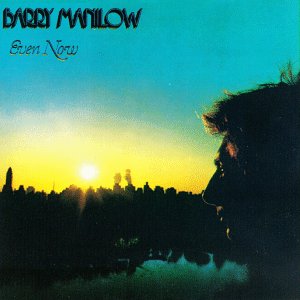
Even Now is the fifth studio album by singer-songwriter Barry Manilow. It was recorded at A&M Studios in Hollywood, California, and released in 1978. The album reached triple platinum and spun off four hit singles in 1978 and early 1979: the title song, "Can't Smile Without You", "Copacabana" and "Somewhere in the Night". Even Now peaked at No. 3 on the U.S. Billboard 200 album chart on April 8, 1978.
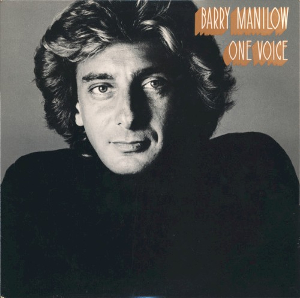
One Voice is the sixth studio album by singer/songwriter Barry Manilow, released in 1979. It was recorded at United Western Studios and Allen Zentz Recording in Hollywood. The album peaked at #9 on the Billboard 200 chart and was certified double platinum by RIAA. The album contained three top-40 singles, "Ships" which peaked at #9, "When I Wanted You" at #20 and "I Don't Want to Walk Without You" which hit #36 on the Billboard Hot 100.

Barry is the seventh studio album released by American singer and songwriter Barry Manilow in 1980 on Arista Records. The album was certified Platinum in the US by the RIAA.

If I Should Love Again is the eighth studio album released by singer and songwriter Barry Manilow. The album was recorded at United Western Recording Studios in Los Angeles, California. The album was released in 1981, and it was certified gold.

Here Comes the Night is the ninth studio album by singer-songwriter Barry Manilow, released in 1982 by Arista Records. The United Kingdom release went by the title I Wanna Do It With You. It received a Gold certification from the RIAA. The album was recorded at Sound City Recording Studios in Van Nuys, California.
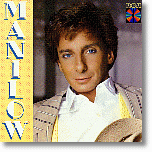
Manilow is the eleventh studio album by singer-songwriter Barry Manilow, released in 1985. It was his first album to miss the Top 40 and fail to earn a gold certification. Many feel it was due to the prominence of synthesizers, a departure from his renowned piano ballads. This album was one of Manilow's two albums with RCA Records.
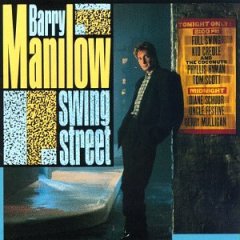
Swing Street is the twelfth studio album by composer and singer Barry Manilow, released in 1987. Three of the tracks on the album featured Manilow in a duet with another singer. The tracks were recorded at various locations. This album marks Manilow's return to the Arista Records label from RCA Records, where he had two releases from 1985 to 1986 including Manilow and the soundtrack for the musical film Copacabana. The title of the album refers to 52nd Street in Manhattan, between 5th and 6th Avenues, which was the jazz mecca during the late 1930s and early 1940s.

Barry Manilow is a studio album released by singer and songwriter Barry Manilow in 1989. It was Manilow's thirteenth studio album overall and second studio album on his second tenure with Arista Records. The album represented a hint of future album releases in that many of the songs were not written/co-written by Manilow, which until that point had been rare for him. After the release of this album, Manilow embarked on introducing contemporary audiences to pop music of the 1930s through the late 1940s.

Because It's Christmas is the first of three Christmas-themed albums released by singer-songwriter Barry Manilow. The album was released in 1990 and was a huge success, becoming Manilow's first platinum album in the United States since 1980's Barry. It also began a period in Manilow's career in which he recorded cover albums. Each album would focus on a particular style of music. He continued this pattern until the release of Here at the Mayflower in 2001.
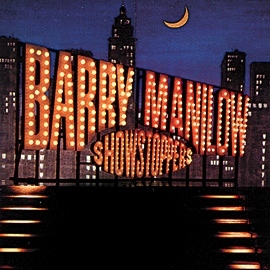
Showstoppers is an album by singer-songwriter Barry Manilow, released in 1991. It was his first album to not feature any original music.

Singin' with the Big Bands is a 1994 album by Barry Manilow.

Manilow Sings Sinatra is an album by singer-songwriter Barry Manilow, released in 1998. It is a compilation of Manilow singing songs originally made notable by Frank Sinatra, who had recently died. The album also featured two new compositions, intended as tributes to Sinatra.

The Greatest Songs of the Sixties is Barry Manilow's sequel album for The Greatest Songs of the Fifties. The album was another major hit for Manilow in the United States, selling nearly 50% more than his previous album in its opening week. As with its predecessor, this album was produced by Clive Davis, along with Manilow and David Benson. The classics performed in this album includes Frankie Valli's "Can't Take My Eyes Off You", Elvis Presley's #1 hit "Can't Help Falling in Love", Beatles' "And I Love Her" and Frank Sinatra's "Strangers in the Night".

The Complete Collection and Then Some... is a four-disc and one video greatest hits compilation by American pop singer Barry Manilow. It features 70 tracks including unreleased songs and five new recordings. It was certified RIAA gold. Originally released in 1992 with a VHS cassette, this box set was re-released on September 6, 2005, with a DVD replacing the tape.

The Greatest Songs of the Seventies is Barry Manilow's follow up to his previous album, The Greatest Songs of the Sixties. The album was released on September 18, 2007. The album was released under Arista Records and it features some of Manilow's hits in acoustic.

The Greatest Love Songs of All Time is a studio album by American singer Barry Manilow, released on January 26, 2010 through Arista.
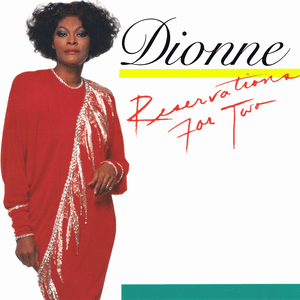
Reservations for Two is a studio album by the American singer Dionne Warwick. It was recorded during the spring of 1987 and released on July 30 of that year. Her eighth album for Arista Records, it was again executive produced by label head Clive Davis. Warwick reteamed with Barry Manilow and the duo Burt Bacharach and Carole Bayer Sager to work on the album, while Kashif, Jerry Knight, Howard Hewett and Smokey Robinson also contributed to the tracks.

This Is My Town: Songs of New York is a studio album by American singer-songwriter Barry Manilow, released on April 21, 2017 by Decca Records and Stiletto Entertainment. The album celebrates Barry Manilow's hometown New York City by "saying thanks to the city for giving me my ambition, my sense of humor and my decency", according to Manilow. It consists both of new original Manilow compositions and standards "evoking the spirit and energy of New York City".




















